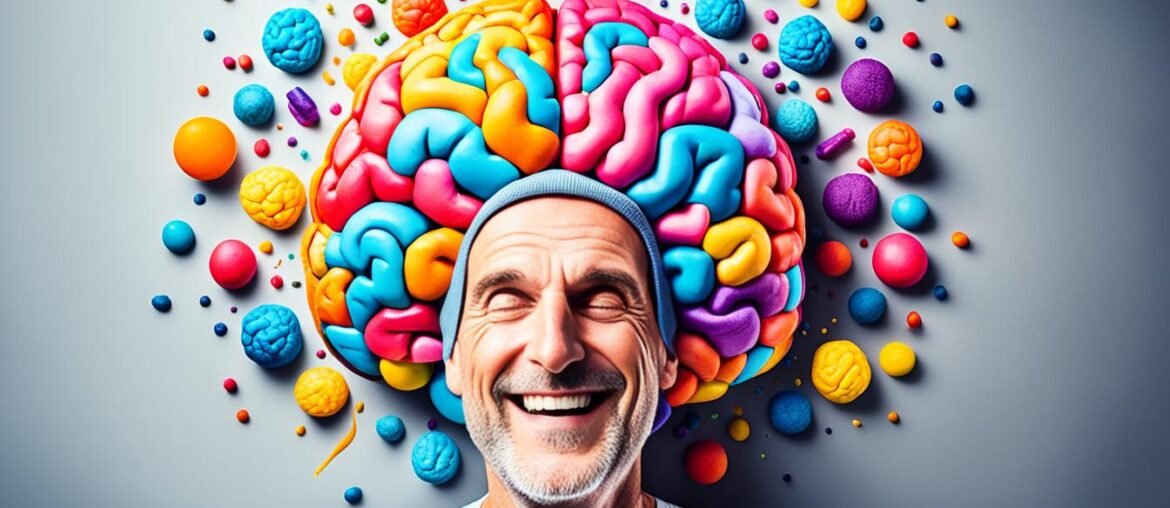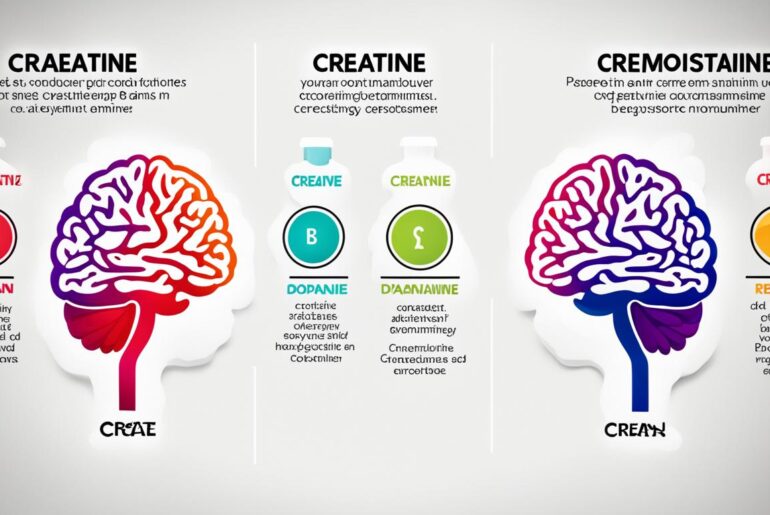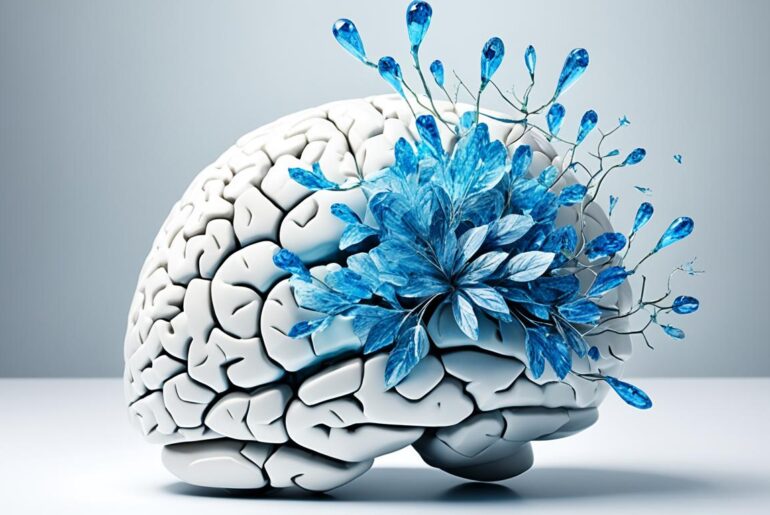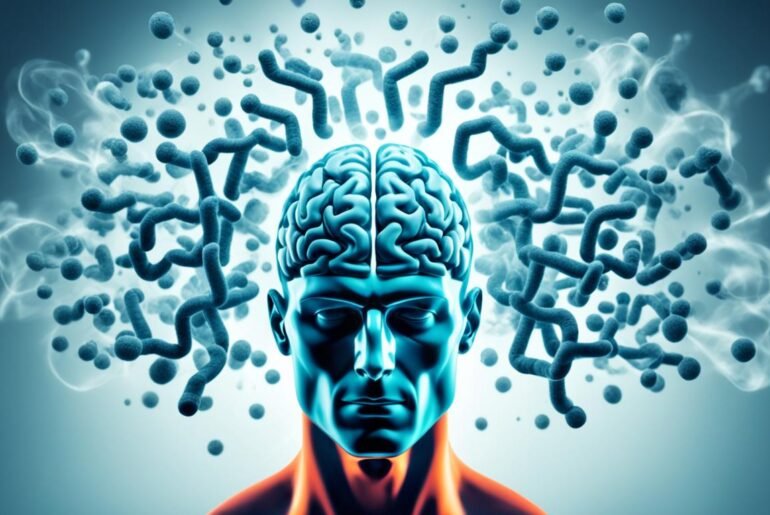When we consider supplements like creatine, muscle mass and athletic performance often muscle their way into the spotlight. Yet, a startling narrative is quietly unfolding in the realm of mental health: creatine, long lauded for its physical benefits, may also be a potent agent for mood enhancement and mental well-being. I’ve been delving into the potential impact of creatine on mental health, and emerging research suggests this natural compound could be more than just a muscle booster—it might just lift our spirits too.
Traditionally associated with sports nutrition, creatine has begun to captivate the attention of mental health experts due to its neurological benefits. Studies are revealing that the creatine benefits for mental health could mark a paradigm shift in how we approach mood disorders and cognitive impairments. As a journalist dedicated to health and science, I’m fascinated by how creatine and mood enhancement might intertwine. This compelling intersection invites a closer examination of whether supplementation can indeed have a favorable impact on mental well-being and if creatine can boost mood as effectively as it does physical performance.
Does creatine play a beneficial role in mental health as it does in muscle synthesis? Stay with me as we explore this question together, shedding light on the exciting advancements in creatine research and their implications for our mental fitness.
Key Takeaways
- Emerging studies indicate that creatine has more than just physical benefits, potentially enhancing mental health as well.
- Creatine’s role in energy homeostasis has implications for cognitive functions and emotional health, warranting further exploration.
- Recent research supports the use of creatine as an adjunct treatment in various psychiatric conditions, pointing to its versatile therapeutic potential.
- The relationship between creatine supplementation and mood improvement is gaining interest, with preliminary findings suggesting a positive correlation.
- Ongoing research into the impact of creatine on mental well-being reveals a compelling case for its role beyond muscle and fitness.
The Growing Interest in Creatine Beyond Muscle Building
In my exploration of creatine’s expanding role in health and wellness, I have become particularly intrigued by its journey from a mere muscle enhancer to a cognitive and mood modulator. Once celebrated predominantly by athletes for its performance-boosting abilities, creatine now captures the attention of medical professionals and researchers as a potential ally in the realm of mental health.
Historical Context: Creatine in Athletics and Fitness
Historically, the primary narrative surrounding creatine was tightly bound to athletics and fitness. Known for its ergogenic effects, it was the go-to supplement for athletes engaged in high-intensity training, where it was practically synonymous with increased muscle strength and improved exercise recovery. The spotlight on creatine shone largely upon its capacity to enhance physical performance, with little consideration for its deeper biochemical roles.
Shift in Focus: Creatine’s Role in Cognitive and Emotional Health
However, as scientific curiosity broadens, so does the understanding of creatine. Research has begun to uncover its vital function not only in muscular but also in brain development. This pivot points to a substantial shift in focus, from muscle fibers to neuron fibers, where discussions now revolve around does creatine improve mood and mental health, and the potential it holds in the treatment of various cognitive and psychiatric conditions.
The realm of creatine supplementation for mental health is burgeoning, with compelling evidence suggesting its impact on cognitive function including learning, memory, and even emotional regulation. It is no longer just a supplement for the body but also for the mind, where its role in energy metabolism could significantly influence mental well-being. Furthermore, the putative benefits of creatine have extended to its application in complementary and alternative medicine (CAM), specifically targeting psychological stress, mood disorders, and anxiety.
Indeed, the comprehensive scope of creatine’s influence is a testament to its versatility, wherein its value transcends the confines of the gym, reaching the potentially more complex gymnasium of the mind. The investigation into the effect of creatine on mood and cognitive function is gathering more support, encouraging a new wave of clinical inquiry and application.
Understanding Creatine’s Functions in the Body
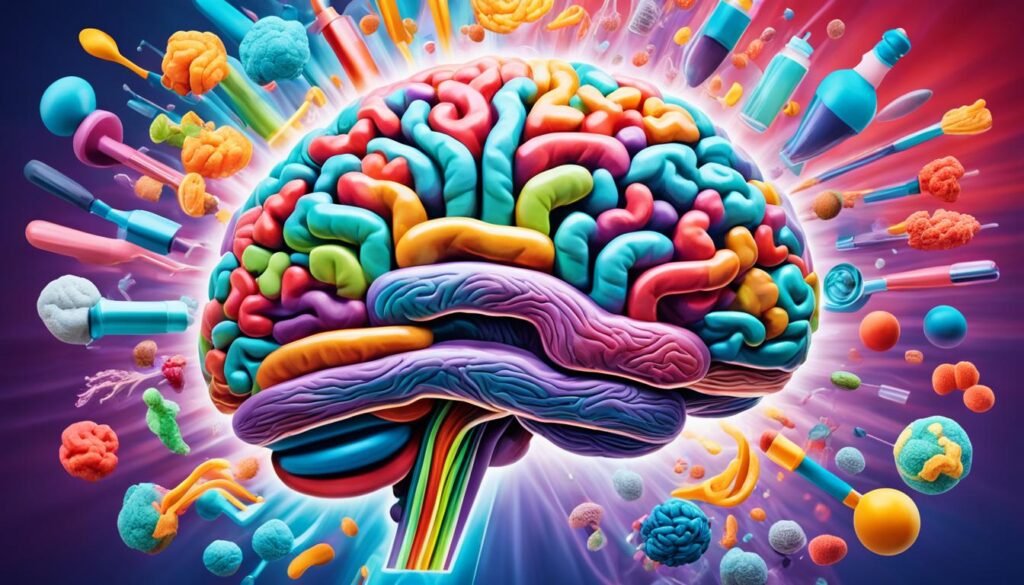
As a writer deeply fascinated by the intersections of nutrition and neuroscience, I’ve taken a particular interest in how certain supplements might affect our mental state. Creatine, a compound vital for energy production in the body, has surfaced in discussions concerning mental performance and well-being. Let’s delve into what this might mean for the brain’s intricate symphony of processes.
Energy Buffering: The Connection Between Creatine and ATP
In the quest to understand how creatine and mental performance are linked, it’s crucial to begin by examining creatine’s primary function as an energy reservoir. This organic acid plays a pivotal role in the energy-transfer process within cells, ensuring a steady supply of adenosine triphosphate (ATP), essentially the cell’s energy currency. By replenishing ATP levels, creatine ensures that our muscles and, critically, our brain, have the energy required to perform at optimal levels.
Brain Energy Demand and Creatine’s Potential Role
Our brains are energy-hungry organs. Despite its modest size relative to the body, the brain consumes an immense amount of energy to maintain normal function. This is where creatine steps in. By supporting the regeneration of ATP, creatine could be a key player in meeting the brain’s high energy demands, potentially influencing how it impacts mental state. The speculation that creatine supplementation might improve cognitive functions has propelled scientists to investigate its therapeutic capacities for neurological conditions and its overall role in cerebral energy metabolism.
Through this intricate dance of energy production and utilization, the question that emerges is: does creatine affect mental state? Empirically, this area requires more research, but anecdotal accounts and preliminary studies provide intriguing possibilities that creatine could indeed be a critical nutrient for our mental machinery. With this knowledge, I continue to explore the potential of creatine in augmenting not just physical but also cerebral vitality, an endeavor that encapsulates the essence of holistic health and performance optimization.
Insights from Epidemiological Data on Mental Health and Creatine Supplementation
As we delve into the realm of mental health, it’s evident that the United States faces significant challenges. Each year, mental illness touches the lives of millions, creating an impetus for alternative treatment modalities that go beyond traditional methods. I have been particularly intrigued by the growing trend towards embracing Complementary and Alternative Medicine (CAM) therapies, including the use of creatine for its potential psychological effects and mental health benefits.
Statistics on Mental Illness and Treatment Limitations
The statistics on mental illness are sobering; they illuminate the harsh reality of treatment limitations faced by countless individuals. My exploration into this topic reveals that despite the prevalence of psychotropic medications, many Americans find these options fall short, hindered by issues such as delayed effects, adverse side effects, and poor patient adherence.
Emerging Trends: Creatine as a Complementary and Alternative Medicine (CAM)
The search for improved treatment outcomes has led to an increase in the popularity of CAM therapies, prominently featuring creatine. I’ve learned that the notable safety profile, bioavailability, and tolerability of creatine supplementation are key factors why researchers and clinicians are acknowledging its potential in the mental health space. The reported creatine benefits for mental health are stimulating a change in how we approach psychiatric disorders, positioning creatine as a beacon of hope for many who have struggled with conventional treatments.
Does Creatine Improve Mood and Mental Health?

As someone deeply invested in the intersection of nutrition and mental wellness, I’ve explored numerous studies that suggest a compelling connection between creatine and mental health. Specifically, a systematic review of clinical trials has highlighted creatine’s role in not just enhancing physical performance but also potentially improving mental health with creatine. These studies illuminate creatine’s moderate but meaningful impact on memory, particularly among older populations whose cognitive functions benefit significantly from supplementation.
It’s intriguing to note that individuals who may benefit from creatine are not limited to age-related cognitive decline. Those experiencing stress or those with insufficient dietary creatine intake, like vegetarians, might find that creatine and mood improvements go hand in hand. The implications extend to mood disorders with metabolic concerns; emerging clinical trials have hinted at creatine’s ability to alleviate depressive symptoms.
Indeed, it’s an auspicious time for considering how adjuvant therapies, such as creatine, could redefine the treatment landscape for mood and cognitive disorders.
In line with these developments, individuals with mild traumatic brain injuries have also been spotlighted as potential beneficiaries of creatine’s therapeutic effects. Here’s how creatine’s properties cater to enhancing brain health:
- Augments energy production within the brain.
- Supports overall brain function and cognitive processes.
- May improve neurotransmission, vital for mood regulation.
Nevertheless, while the scientific community continues to understand creatine’s mental health benefits fully, these early findings provide a promising outlook on how this natural compound could impact mental well-being. What’s becoming increasingly clear is creatine’s multifaceted role, with possibilities extending beyond the confines of muscle and into the realm of mental fortitude.
Scientific Findings on Creatine’s Psychological Effects
My exploration into the world of creatine supplementation for mental health has uncovered compelling scientific evidence of its benefits beyond physical performance. The intricate ways in which creatine impacts mood and cognitive function mark it as a substance of great interest in the realm of psychological well-being.
Creatine and Cognitive Functions: Memory, Attention, and Learning
Those of us invested in the cognitive science community have long been fascinated by the potential enhancements creatine can offer. A myriad of studies punctuate the discussion, revealing how regular creatine supplementation can bolster memory and amplify one’s attention span. Further, there’s an undeniable link between creatine intake and the facilitation of complex learning processes. The effect of creatine on mood and cognitive function is notably pronounced, casting this natural compound in the limelight as a cognitive augmenter.
Potential Benefits of Creatine for Mood and Anxiety Disorders
The psychological effects of creatine extend to the vast domain of mood and anxiety disorders. With each research paper I’ve perused, it becomes increasingly clear that the creatine-phosphocreatine circuit is intimately involved in energy metabolism, a key player in neurochemical activities linked to psychiatric health. As someone deeply invested in mental health advocacy, the prospect that dietary creatine can serve therapeutic ends for individuals grappling with these conditions is a beacon of hope in the often tumultuous sea of mental health remedies.
These findings are not just academic musings but tangible insights that could transform the future of mental health treatment. The seed of change has been sown, and as it germinates, we may see creatine become a standard ally in the fight against cognitive dysfunction and mood-related disorders.
Dietary Creatine Intake and Its Connection to Depression

My investigation into the potential mental health benefits of creatine supplementation has led me to scrutinize data from national health surveys. Specifically, an analysis of the National Health and Nutrition Examination Survey (NHANES) highlighted intriguing patterns pertaining to dietary creatine and its association with mood disorders. These findings underscore the potential of creatine’s role in depression prevention.
Evidence from Population Studies and NHANES Data Analysis
The NHANES database has provided a broad view of health and nutrition within the U.S. population. An extensive evaluation of this data compared the dietary habits of thousands of Americans, revealing a significant trend; those with higher creatine intake appeared less prone to symptoms of depression. This was especially pronounced among specific demographics.
The relationship between creatine consumption and depression risk seems to differ across various groups. Women and the younger adult population, in particular, have shown a more robust inverse relationship indicating a potentially stronger effect of creatine on mitigating depressive symptoms. Moreover, the beneficial connection was most apparent in individuals who weren’t already using antidepressant medications. This information could guide future research on creatine supplementation for mental health, targeting specific at-risk groups for depression prevention efforts.
Neurobiology of Creatine: Effects on Brain Chemistry and Function
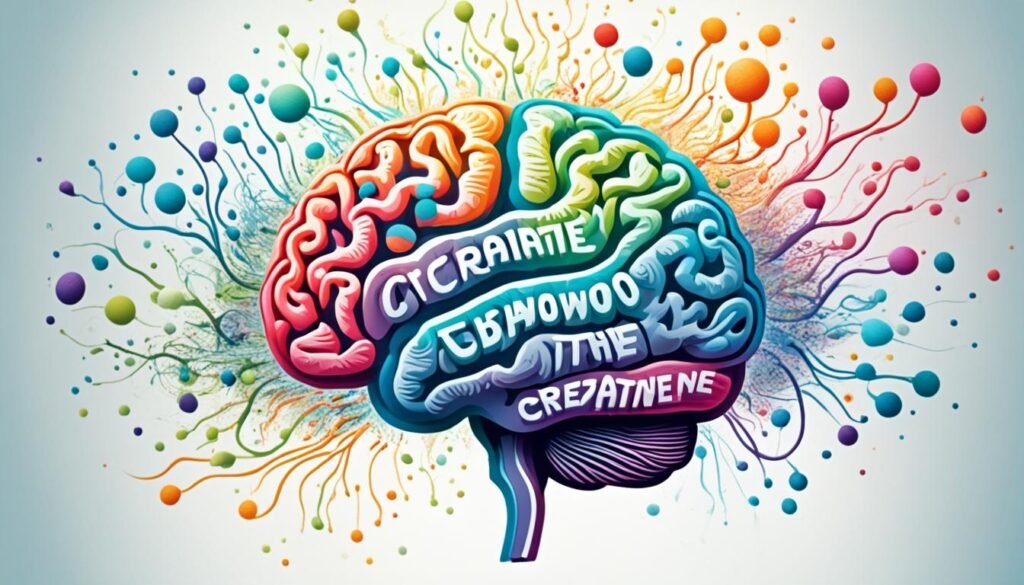
The intricate workings of the human brain are a marvel of biological engineering, and the role of creatine within this matrix is becoming increasingly evident. As I delve into the neurobiological aspects of creatine, we understand that it is not just a muscle-building aid, but a crucial element in maintaining the delicate balance of our mental performance. The neurological implications of creatine consumption form a fascinating domain where energy meets cognition.
The Creatine-Phosphocreatine Circuit in Neuropsychological Health
Creatine’s pivotal role in the creatine-phosphocreatine circuit represents a cornerstone of our brain’s energy homeostasis. The ability to store and mobilize energy efficiently in high-demand conditions, especially in neurons, underpins much of our cognitive abilities. When I consider the effects of creatine on this energy circuit, it’s apparent how even minute changes in creatine dynamics may significantly impact mental performance.
Creatine Metabolism Changes: Implications for Psychiatric Disorders
Aberrations in creatine metabolism are increasingly being associated with psychiatric disorders, suggesting a potential link that may illuminate new therapeutic pathways. My exploration into this association reveals that conditions such as schizophrenia and mood disorders may exhibit altered creatine levels, which could potentially underline some of the energy deficits observed in these patients.
By further understanding the intricacies of creatine synthesis, transport, and its cerebral consumption patterns, we open new doors to treating and managing mental illness. It’s a path that not only promises more nuanced interventions but also a better grasp of the myriad ways our brain sustains its complex functionality.
Creatine Supplementation: Dosage, Safety, and Efficacy

When considering the creatine dosage for mental health, I’ve found that aligning with therapy protocols derived from physical performance research provides a reliable framework. These guidelines frequently advocate for a standardized supplementing approach, often suggesting a regimen akin to 5 grams per day. Such a routine is thought to saturate muscle stores, potentially providing the brain with the surplus needed to reap cognitive benefits. Whether this dosage acts synergistically with our neurochemistry for mood enhancement has sparked my curiosity and warrants further examination.
Understanding the Dosage and Therapy Protocols of Creatine
In exploring creatine therapy protocols, a notable method emerges—preloading. Preloading involves a higher intake over a short period to rapidly increase creatine levels, followed by a maintenance dose to sustain these elevated levels. This practice mirrors the strategies I often consider when embarking on a new supplementation regimen for physical health, showcasing its versatile application for mental health support as well.
Safety Profile and Acceptability of Creatine as a Supplement
As for safety and efficacy of creatine supplementation, the compound’s track record is robust, underscored by extensive studies. Creatine monohydrate, in particular, claims the crown for being the most documented and cost-effective variant. This coalescence of affordability and scientific substantiation elevates its stature within the supplement realm. It’s reassuring that concerns about safety are further assuaged by third-party certification, a vital endorsement of purity and potency that I always look for in my supplements.
Exploring the Impact of Creatine on Mental Well-being

As we delve deeper into the potential health benefits of creatine supplements, the conversation increasingly turns towards its effects on mental health. While most are familiar with creatine’s muscle-boosting abilities, it’s the impact on cognitive function and mood enhancement that’s currently shining under the spotlight. Clinical trials of creatine have shed some light on the subject, with results that are as intriguing as they are promising.
Reviewing Clinical Trials: Creatine’s Effectiveness in Improving Mental Health Outcomes
I’ve been examining various clinical trials of creatine, seeking to understand how this supplement could play a role in enhancing mental health outcomes. Research has shown that creatine may affect everything from brain function to mood regulation, and the data available from these trials suggest that mental health supplementation with creatine can offer noticeable benefits.
For example, one study found that participants using creatine exhibited improved memory and increased cognitive functioning. Even more compelling is the mounting evidence that creatine supplementation may contribute to positive mental health outcomes in individuals suffering from depression and anxiety.
“The potential of creatine as a mental health supplement is supported by clinical evidence suggesting improvements in both brain function and mood disorders.”
These findings pose the question: how can we integrate these benefits into current mental health practices to utilize creatine effectively and safely for those in need?
Integrating Creatine Supplementation into Mental Health Practices
The integration of creatine supplementation into mental health practices must be approached with cautious optimism. As a journalist who has tracked the progression of creatine from fitness circles to mental health discussions, I’ve seen the conversation evolve. It isn’t just about whether creatine can be helpful but how we can apply these benefits practically and personalize them for individual treatment plans.
It’s not enough to recognize the potential of creatine; healthcare professionals must consider factors like dosage, individual patient needs, and possible interactions with other medications. This level of careful consideration can ensure that the addition of creatine into mental health protocols is done with the patient’s best interest at heart, maximizing therapeutic outcomes.
The evidence at hand certainly suggests a place for creatine in the sphere of mental health treatment, but continued research is paramount. Clinical trials of creatine continue to uncover new layers of its influence on the mind and mood, guiding us toward a future where mental health treatment could carry fewer side effects and offer a brighter outlook for those affected by mental health conditions.
Conclusion
As we delve into the intricate relationship between creatine and mental health, I find myself optimistic about the therapeutic horizons that lie ahead. The burgeoning body of research delineates a clear trajectory, highlighting the neuroprotective potential of creatine and its role in cognitive enhancement. The narrative up until now paints a hopeful picture: creatine, once pigeonholed within the domain of physical fitness, now emerges as a beacon of innovation in mental health management. As a professional navigating the healthcare landscape, I recognize the importance of evidence-based practice and the transformative impact of emerging research on clinical protocols.
The Future of Creatine Research in Mental Health
My gaze is firmly set on the future research in creatine and mental health. The quest for understanding the nuanced mechanisms of creatine in the brain fosters an anticipation that more discoveries are forthcoming. The task at hand is not trivial—determining optimal dosages, elucidating the pathways of action, and substantiating the long-term implications all stand as crucial pillars for advancing our knowledge. Healthcare practitioners and researchers alike are on the precipice of integrating these insights into a broadened scope of treatment modalities, one that may very well redefine standards of care in mental health therapeutics.
Takeaways for Healthcare Professionals and Patients
For my fellow healthcare professionals and the patients we serve, the promise of creatine in healthcare is a narrative worth following. The applications of creatine extend beyond muscle fibers, infiltrating the realms of mood stability, cognitive alertness, and overall mental equilibrium. Both parties should remain vigilant and informed, as our collective understanding of creatine’s benefits continues to shape the practices that foster mental wellness. By staying abreast of the latest developments, and by applying an integrative approach to treatment, we advocate for a healthcare system that embraces innovation and upholds the tenets of holistic well-being.
FAQ
What are the creatine benefits for mental health?
Creatine has been shown to have potential benefits for mental health, including improved memory, attention, learning, and mood enhancement. It may also help alleviate symptoms of mental health conditions such as depression, anxiety, and mood disorders.
Can creatine supplementation lead to mood enhancement?
Studies suggest that creatine supplementation can enhance mood, especially in individuals with metabolic dysfunctions associated with mood disorders. It might also provide mood-stabilizing benefits for people under stress or those who have dietary creatine deficiencies.
What impact does creatine have on mental well-being?
Creatine plays a role in mental well-being by acting as an energy buffer and supporting brain function. It has shown potential in improving cognitive functions such as memory and reasoning, as well as offering mood-stabilizing effects.
Does creatine improve mood and mental health?
Emerging research indicates that creatine has a positive impact on mood and mental health. Clinical trials have observed creatine’s antidepressant effects and its ability to improve cognitive function and mental performance.
How does creatine function as an energy buffer?
Creatine helps maintain energy balance within cells by regenerating adenosine triphosphate (ATP), the energy currency of the cell. This function is vital in high-energy demand organs such as the brain, and essential for cognitive processes.
Can creatine be considered a complementary and alternative medicine (CAM) for mental health?
Yes, due to its safety, bioavailability, and low side-effect profile, creatine is increasingly being considered as a CAM therapy for psychiatric disorders and mental health conditions.
What cognitive functions may benefit from creatine supplementation?
Creatine supplementation can potentially benefit a range of cognitive functions including memory, attention, speech, language, learning, and overall mental performance.
Are there specific groups that might benefit more from creatine for mood and anxiety disorders?
Individuals suffering from mood and anxiety disorders associated with energy metabolism dysfunction, vegetarians, the elderly, and those with traumatic brain injuries may experience more pronounced benefits from creatine supplementation for their mood and anxiety symptoms.
How does creatine intake relate to depression?
There is an inverse relationship between dietary creatine intake and depression, particularly strong among women, younger adults, and those not on antidepressant medication. Creatine’s influence on brain bioenergetics is thought to account for its antidepressant effects.
What are the neurological implications of creatine consumption?
Creatine consumption affects brain chemistry by participating in the creatine-phosphocreatine circuit, which plays a key role in cellular energy maintenance. Alterations in creatine metabolism have been linked to various psychiatric disorders, suggesting its potential neurobiological impact.
What is the recommended dosage of creatine for mental health benefits?
While the optimum dosage specific for mental health benefits is yet unestablished, many trials follow protocols designed for physical performance, which typically include a daily intake of 5 grams or a loading phase followed by maintenance doses.
Is creatine supplementation safe?
The safety profile of creatine is well-established, with thousands of studies supporting its use. Creatine monohydrate, in particular, has been shown to be safe, effective, and well-tolerated as a supplement.
How might creatine supplementation be integrated into mental health practices?
Creatine might be integrated into mental health practices by systematically pairing it with conventional treatments, tailoring supplementation to individual patient needs, and monitoring outcomes to optimize its benefits in mental health care.

